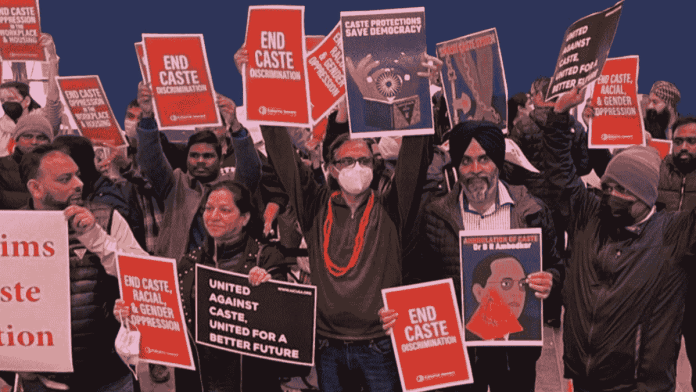New Delhi: Weeks after Seattle’s historic move to ban caste-based discrimination in the city, the Toronto District School Board is set to vote on a similar motion. But it’s facing resistance from Hindu groups.
According to The Globe and Mail, the motion is to include caste as a protected category alongside race, gender, sexuality, and religious and other minorities. The motion will come up before a 22-member board school district board — the largest in that country — on 8 March.
If the motion, brought by Yalini Rajakulasingam, a trustee of the Toronto District School Board on 8 February, gets passed, it would be a historic first for Canadian schools, the Globe said.
In her comment to the newspaper, Rajakulasingam said she brought the motion after parents informed her about instances of bullying, harassment, and casteist slurs that oppressed caste students are subject to., adding that the board’s human rights office “has no way” to file a complaint under caste.
Complaints are filed as either race or religion when caste “has its own specific power structure”, she added.
Last month, Seattle became the first US city to ban caste-based discrimination after a vote by its city council.
Also Read: What dominant Hindus in US get wrong about Seattle caste ban
Resistance
According to a news report in the Hindustan Times, Rajakulasingam’s motion cites “caste-based oppression is experienced by various faith communities in South Asia and the Caribbean” and a “rise in documented caste-based discrimination in the diaspora, including Toronto”.
It adds that “caste may be identified by but not limited to an individual’s last name, family occupation, diet and area of origin, and self-identification can be unsafe when caste-based discrimination is not recognised”.
The motion also seeks to form a working group of activists “who self-identify as Dalit and are from caste-oppressed groups”, who will have the mandate “to define caste-based discrimination, lead curriculum and instruction development on caste oppression and professional development for staff”.
But the TDSB’s proposal has met with resistance from the Canadian Organisation for the Hindu Heritage Education (COHHE), who called the motion “Hinduphobic”.
In a petition that has garnered 5,000 signatures, the group argued that there is a lack of evidence of caste oppression in Toronto and hence makes the motion “misleading” and “lacking in integrity”.
Rajakulasingam, however, differs, saying that the motion doesn’t single out any faith but instead addresses how it affects South Asian, African, and Caribbean diasporas.
(Edited by Uttara Ramaswamy)
Also Read: Seattle caste ban isn’t about Hinduism or Indians. It’s America’s Great Culture War






